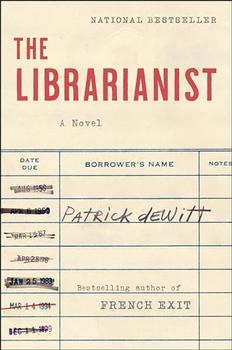Summary | Excerpt | Reviews | Beyond the Book | Readalikes | Genres & Themes | Author Bio

A Novel
by Patrick deWitt
Bob went to say goodbye to Maria but saw through her door she was again talking on the phone. He stood around a while, then abruptly left, heading for home. He felt angry, which was not at all common for Bob; but he found himself wishing he'd never come to the center in the first place. It began to rain and he shielded the books under his coat and his face puckered against the damp. He was unlocking his front door when he heard the phone ringing. The kitchen was unlit; it was clean and orderly in the darkness of the day. He set his books on the countertop and lifted the phone off the wall and said hello.
It was Maria. "What happened?"
"Nothing happened. You were right, so I left."
"But you didn't tell me you were leaving."
"You were on the phone."
"You could have waited a minute."
"I waited several minutes."
Maria asked, "Are you pouting?"
"A little bit, yes."
"All right, well I can't say you haven't earned it, and after I get off the phone you can pout your little heart out, but can you put a plug in it for a minute? Because I have an idea. Will you listen to me?"
"I'm listening."
"I'd like to propose that you keep coming back here but without the books."
"Come back without the books."
"Leave those books at home, Bob."
"And what would I be doing there?"
"Just that: being here."
"Being there doing what?"
"Being here being around. Most of the people at the center are in a state of letting go. Some of them are unbothered by this, or unaware; but others are afraid, or confused, or angry. You're the steady, hand-on-the-tiller type, and I think your presence might be useful. I just got off the phone with a man who wants to perform sleight of hand tricks for us. Half the people at the center have some degree of dementia. The whole world's a sleight of hand trick already, and I'm not looking to give them any more examples of instability. To my way of thinking, that's where you come in." She pressed Bob to commit to visiting the following week, but he claimed he needed to think on it, affecting a coolness as he rang off. In truth, though, he was moved by Maria's assessment of his character. The functional purpose he'd known in his professional life had been put away when he retired, but now that cold piece of his person came back to life. In the morning he called Maria to agree to the schedule, and on the appointed day he arrived at the center, and without any books, as prescribed.
HE STILL WASN'T FULLY SURE WHAT HE WAS SUPPOSED TO DO, however.
"Just move around, circulate," Maria told him. "Ask someone what their name is, then tell them yours. It's like a cocktail party but no cocktails." She gave him a friendly little shove into the Great Room and he looped the long table, waving to anyone who made eye contact, hopeful for an invitation to linger. But nobody was inclined to speak with him, and he only continued walking. At the back of the room the woman named Jill was again at her card table, working on another puzzle. Bob was stepping up to greet her when he noticed the man in the electronic wheelchair and big beret sitting in the opposite corner beneath a wall-mounted television. This scenario struck Bob as the more promising of the two; he crossed over and pulled up a chair. The man in the big beret was watching a tennis match, men's singles; Bob took advantage of his distraction to make a thorough inspection of his features: a countenance of high, true ugliness. The ample flesh of his face was mottled with inky purple staining, so that he looked as if he'd been poisoned or gassed; he had a broad and pitted nose destroyed by burst vessels; he had no eyebrows or eyelashes, and his eye whites were pink going red. These elements came together to form the picture of a man with unhealthy habits and gargantuan appetites running unchecked across the length of several decades. But there was also an animation about him that spoke of a defiant life force; something like joy, but mutant.
Excerpted from The Librarianist by Patrick deWitt. Copyright © 2023 by Patrick deWitt. Excerpted by permission of Ecco. All rights reserved. No part of this excerpt may be reproduced or reprinted without permission in writing from the publisher.
Your guide toexceptional books
BookBrowse seeks out and recommends the best in contemporary fiction and nonfiction—books that not only engage and entertain but also deepen our understanding of ourselves and the world around us.